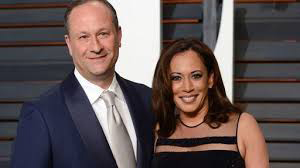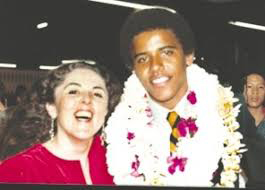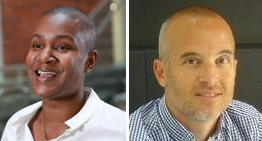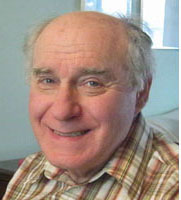Opinion
Kamala Harris and her fluid identity

By BERNIE BELLAN
The announcement that Joe Biden has chosen Kamala Harris as his running mate immediately set off a torrent of applause from many Jews who, if they weren’t aware before that Harris is married to a Jewish man, Doug Emhoff, are certainly aware now.
But, in checking off one more box that should broaden what was already a very diverse set of qualifications for the vice-presidency of the U.S., Kamala Harris’s rather fluid identity raises some questions about how any individual chooses to identify in this day and age.

While we can’t pick our skin colour – it’s always been a source of interest to me how certain individuals of mixed descent choose to identify strongly as a member of one particular racial group. The case that I find most interesting is that of Barack Obama, who had a white mother, Ann Dunham, and a Kenyan Black father, Barack Hussein Obama Sr. Obama’s parents divorced when he was only a few months old.
Barack Obama’s mother subsequently married an Indonesian man and young Barack spent part of his childhood in Indonesia. He also has half brothers and sisters from that relationship, as well as from his father’s subsequent marriage to a Black woman.
In addition to his mother, with whom he was very close, Obama was also raised by his mother’s parents in Hawaii from the time he was 11 until he went off to college.
Obama eventually moved to Chicago and chose to identify with the Black part of his identity. He’s always referred to as America’s “first Black president”, but one wonders what path his life might have taken had he chosen instead to be more ambiguous about his racial identity.
Similarly, Kamala Harris is the daughter of a Black man from Jamaica and an Indian mother. We’ve also learned that Harris spent her formative years in Montreal (in Westmount) with her mother. In an interesting article that was posted on the Sun chain of newspapers, columnist Tarak Fatah made this observation about Harris:
“Writing about her Tamil Indian mother, Kamala Harris once wrote that she is the ‘reason for everything.’ In her memoir and a New York Times article, she explained, ‘There is no title or honour on Earth I’ll treasure more than to say I am Shyamala Gopalan Harris’s daughter. That is the truth I hold dearest of all.’
“Yet, when it came to list her ancestry on the U.S. census form, Kamala Harris dropped any link to her mother and chose instead to be known as African-American instead of Asian Indian.”

Finally, here in Canada we have our own recent case of someone with an interesting patchwork of identities in the form of Annamie Paul, who is both Black and Jewish, and who is now favoured to win the leadership of the Federal Green party. We’ve already carried two articles about Paul, one from the JTA, and one from Gerry Posner, both of which discuss her decision to convert to Judaism while she was a student in Princeton.
In looking back at those articles, I was particularly struck by this line from the JTA story about Paul: “Like picking a religion, Paul looked to shared values to determine which political party she would join when her work no longer prohibited her from doing so.”
So, while Annamie Paul couldn’t choose her skin colour in the same way that Barack Obama and Kamala Harris seem to have done, she chose her religion and now the political party which she is striving to lead.
I offer these examples of fluid identity not as a criticism, but rather as an observation of the degree to which individuals seem to be able to define themselves in ways that can often help them in future endeavours, whether or not that was a motivating factor in their decision. All three of the individuals I have cited here became lawyers – and then ended up entering into politics. I don’t think that’s a coincidence.
Are you as cynical as I am and wonder whether, especially in the cases of Obama and Harris, both their decisions to identify as Black – when they could have identified as something else, were strongly influenced by the thought that it would be far more useful to be thought of as Black if they were to enter into politics?
As for Annamie Paul, full credit to her for daring to be her own person – and seek out both a religion and a political party that conformed with her beliefs. But, the idea of shopping around for a religion – and a political party…well, it does seem rather arbitrary.
Still, as we ourselves have demonstrated in this very paper, with all the attention we’ve heaped on Paul, when someone makes a conscious decision either to convert to Judaism or to marry a Jewish spouse – it’s bound to elicit attention – and that attention can’t hurt someone with political ambitions.
A case that’s even closer to home – and one which I find somewhat confusing is that of Laurelle Harris, whose name has been recently in the news when she conducted a study of alleged discrimination at the Canadian Museum of Human Rights.
Laurelle Harris is a Black woman who converted to Judaism several years ago, but when my wife and I attended an event for the LGBTQ Jewish community a few years ago, and Laurelle Harris was there representing the Jewish Federation, I was quite surprised when she began her remarks that evening by saying, “I am a proud Black Jewish gay woman”.
“Gay?” I thought. I didn’t know Laurelle Harris was gay. (She had been married to Rabbi Larry Pinsker for a time, but then again – being married to someone isn’t necessarily an indication what anyone’s sexual preference is.)
I also thought: “Well, she’s certainly checked off all the right boxes”.
Still, when I’ve mentioned that particular story to others, I’m always met with the same reaction: “Laurelle Harris isn’t gay.” So – why would she say that she is, I wonder?
The point of this is to establish that modern Western societies are changing so rapidly that members of groups who thought they knew how to define that group are often left puzzled by someone’s choice to identify as part of that group. We didn’t have room in this issue to print in its entirety a very thoughtful piece by someone by the name of Alicia Chandler, who describes herself as “a Jewish woman married to a Catholic man”, but she makes a very interesting point about how Jews should be more accepting of interfaith marriages.
Chandler questions all this gushing among Jews over Kamala Harris for her being married to a Jewish man, which she finds somewhat hypocritical. Her piece is titled: “We can’t kvell over Kamala Harris’ Jewish husband while we demonize interfaith marriage.”
In her column, Chandler writes:
“Around the country, you hear the bubbies kvelling:
“Did you know Kamala Harris’ husband is Jewish?
“Did you know her step kids call her mamele?
“Did you see the video with her doing the cute impression of her Jewish mother-in-law?
“Did you hear that he broke a glass at their wedding?
“It is not surprising that the Jewish community is excited to be represented on the Biden-Harris ticket. Political leanings of the community aside, Kamala Harris’s husband, Doug Emhoff, is a member of the tribe, and two of Joe Biden’s children are married to someone who is Jewish.
“But sadly, the Jewish community is a
bit selective in celebrating interfaith marriage. If it brings us a Jewish second gentleman, we will cheer. But interfaith marriage is still taboo to many, and an Orthodox or Conservative rabbi would not have been allowed to preside over the Harris and Emhoff wedding.
“American Jews want to celebrate the Jewish ties of any famous person while still discriminating against the relationships that tie these individuals to the Jewish community.”
Chandler goes on to argue for greater acceptance of interfaith families within the Jewish community, writing that “It is time for full inclusion of all interfaith families in the Jewish community, not just vice presidential nominees and celebrities. In 2013, 44% of all Jews were married to a non-Jew; 58% percent of those married since 2005, and the trend is seemingly on the rise.
“Doug and Kamala are not a rare exception — they represent much of the American Jewish community today. We should make a greater effort to make families like them feel just as included and celebrated.”
Of course, the problem with excerpting Chandler’s column in a newspaper like this one is that it might not be greeted with much favour by many of our readers. While I’m sure that many of you have direct experience with interfaith families – either because you, yourself, are part of one or you have children who are in that situation, I’m realistic enough to know that many of our readers have a hard time coming to terms with the notion that intermarriage is now the norm within our Jewish community.
Even as it’s increasingly difficult to define what it means to be Jewish, however, I think that most of us still take great pride when someone, especially someone as prominent a personality as Kamala Harris, chooses to marry someone Jewish. Okay – so maybe the extent to which she has adopted Jewish norms is limited to her stepkids calling her “momala” (see article on page 2 for an explanation how that came about) and, as noted in Chandler’s piece, a couple other nods to stereotypical Jewish customs – but hey, she chose to marry a Jew, just as Joe Biden also has two children married to Jews (not to mention Donald Trump’s daughter Ivanka and son Eric – also married to Jews).
In Donald Trump’s case, however while he certainly doesn’t gloss over his Jewish familial connections, he is also known to have traded in anti-Semitic stereotypes, such as when he said that he likes “short guys who wear yarmulkes every day” to count his money.
In short – any celebrity’s having a Jewish connection – especially when that celebrity is very high on the pecking order, is a source of some fascination to many of us, but beyond the superficial aspect of it all, what it really says is that being Jewish or being married to a Jew is not nearly the political handicap that it would likely have been not too long ago.
Features
Did the Jewish Federation’s stepping in to force the firing of BB Camp co-executive director Jacob Brodovsky lead to the further alienating of many young Jews from the community?

(June 8, 2024) Introduction: We received the following email from a young Jewish Winnipegger re the BB Camp controversy, which we’ve reported on extensively on this website. We thought it important to post the email as a separate piece rather than as an add-on to an article in which we printed other emails from readers expressing their disappointment at what happened to Jacob Brodovsky, the former co-executive director of BB Camp:
Dear Mr. Bellan,
Thank you for once again cutting through the noise with your April 23rd column, “What the sordid BB Camp affair says about our community.” Your clarity and courage in calling out our rush to judgment and our narrowing definition of “Jewish identity” are deeply appreciated, especially by those of us who feel increasingly alienated in Winnipeg.
I also want to share a troubling observation about one of the loudest voices attacking Jacob Brodovsky: theJ.ca. Their articles—bylines like “Ron East” or “TheJ.ca Staff”—are, in fact, almost entirely generated by artificial intelligence. They contain no verifiable sourcing, frequently hallucinate details, and appear to be little more than a far-right newsletter running smear campaigns under the guise of “journalism.” The entire BB Camp series reads like an AI trained on extremist talking points, regurgitated daily to bully our community into silence.
As a young Jew in Winnipeg, I—and many of my peers—are horrified by the transformation we’re witnessing. What was once a warm, progressive community is now dominated by:
Bigots and Bullies: Parents threatening to pull their kids unless the camp bows to extremist demands.
Florida-style Republican Judaism: A narrow, intolerant ideology portrayed as the only “true” Jewishness.
Collapsing Leadership: Our Jewish Federation leaders, including Jeff Lieberman, have shown they lack the vision or backbone to navigate this crisis.
We stand at a dangerous inflection point. Our community is on the verge of a total and irreversible fascist takeover—an outcome no amount of regret or retrospective apologies can undo.
Please consider reading firsthand accounts from community members who have bravely spoken out:
I know this letter is anonymous and won’t be published, but I hope you see it as proof that many of us are desperate for ethical, forward-looking leadership. Thank you again for using your platform to remind us what Jewish community should mean: diversity of thought, compassion for all people, and the moral courage to call out extremism—no matter where it comes from.
This was NEVER a community of far-right Israelis. This is a shame beyond words.
With gratitude and urgency,
A Concerned Young Jew in Winnipeg
Post script: We had heard from many different sources (who all asked to remain anonymous) that the Jewish Federation’s decision to force the BB Camp board to fire Jacob Brodovsky came as a result of pressure from one or more big donors to the Combined Jewish Appeal. We sent an email to Jeff Lieberman, asking Jeff whether the Jewish Federation’s decision to force the resignation of Jacob Brodovsky as co-executive director of BB Camp came as a result of a donor (or donors) to the Combined Jewish Appeal threatening to withdraw their donation(s) this year unless Jacob were fired. I don’t think anyone would be surprised to learn that Jeff did not bother responding to my request for information.
The Jewish Federation used to advertise elections to its board in The Jewish Post & News for many years, but no longer does so (in the Jewish Post). Instead, it submits a slate of new appointees to its board to members of the current board to be rubber stamped. Is it any surprise that the donors who contribute the most money call the shots for the Federation (which is as its always been. The only difference is the Jewish Federation and the Winnipeg Jewish Community Council before it used to operate with a patina of democracy. Sadly, that is no longer the case.)
We would urge anyone on the Federation board who could give information about what led the board to force the resignation of Jacob Brodovsky to contact us. We would give full anonymity, as we have to the writer of the above letter.
-Bernie Bellan
Local News
Is It Alberta’s Turn to Regulate Online Gambling? Looking at the Possibilities

Online gambling and betting in Canada is booming, with each province allowed to regulate its own space. Ontario, Canada’s most populated province, turned two this year after leading the way in April 2022. In what should motivate Alberta and other provinces, Ontario is already reaping the rewards, generating $100 million annually in gambling revenue. Will the local administration in Alberta do what is needed?
Talks have been rife that Alberta is considering going the Ontario way by having an open-licensing system. In July 2023, the minister for Service Alberta and Red Tape Reduction, Dale Nally, issued a mandate to make this province a hub of online sports betting and gambling.
Alberta Premier Danielle Smith recently asked Nally to cooperate with indigenous partners and other stakeholders to develop an online gaming strategy. The main focus will be on revenue generation and responsible gambling. In light of this, Nally said Alberta’s primary focus is becoming a “leading hub for iGaming” with streamlined regulations and low corporate taxes. Such conditions should position Alberta to become a leading iGaming destination.
A few weeks ago, the minister attended the ICE international gaming conference held in London. Together with Ontario’s Attorney General, Doug Downey, and other stakeholders, Nally participated in a roundtable discussion regarding the status of iGaming in Canada. CDC Gaming Reports also revealed that the discussion highlighted the success of iGaming in Ontario and how Alberta can emulate this success story.
Looking into the Alberta Budget 2024, it’s evident that state monopoly could soon give way to Canadian casinos to thrive in the province. Alberta took the first baby steps towards a more liberal gambling sector after setting aside $1 million for gambling. This budget will support the looming review of the Gaming, Liquor, and Cannabis Act and supporting Regulation. The idea is to review the entire regulatory framework to find more funding ways for Alberta charities and community projects.
Major operators like BetMGM, PointsBet, and PokerStars have since hired lobbyists to ensure commercial operators become a reality in Alberta. Speaking to investors and industry analysts in March this year, PointsBet CEO Sam Swanell tipped Alberta and British Columbia to legalize online betting soon. He noted that this could provide the much-needed expansion of that TAM.
Alberta is yet to take full advantage of online gambling despite being the country’s fourth-largest province, with around 4.3 million people. Smaller markets in North America, such as West Virginia and Connecticut, are already benefiting from commercialized online gambling. The good news is that noises about legal online gambling are getting louder in Alberta. It’s just a matter of when the government will make the announcement.
What Next for Online Gambling and Betting in Alberta?
Including a $1 million gambling review budget is definitely a step in the right direction. However, there’s still much to do to end Alberta’s long-standing gambling status quo. But at least the budget opens the door for further discussions and reforms regarding iGaming in Alberta. That discussion has been underway, although the momentum has increased in the last year or so.
As it stands, PlayAlberta.ca is the only regulated online gaming platform in Alberta. It’s a government-run website operated by the AGLC (Alberta Gaming Liquor and Cannabis). Besides casino games, this website provides sports betting and lottery-style gaming experiences. The legal sign-up age on PlayAlberta.ca is 18 years.
For Albertans who prefer more gambling freedom, the government doesn’t restrict anyone from joining offshore operators. Most gaming sites operating in Alberta are licensed in Curacao, the UK, and Malta. Compared to PlayAlberta.ca, these websites provide a more extensive variety of games, rewards, and general experience.
In conclusion, it’s just a matter of when Alberta will introduce an open-licensing market. This approach has proved to be a success elsewhere, especially in Ontario. A recent Ipsos report in Ontario revealed that only 13.6% of the residents prefer to gamble on offshore websites. Alberta could soon follow this path, although there’s much work to do to realize this dream.
Opinion
Hamas savages make no distinction between Israeli Jews, Arabs

By MYRON LOVE I remember many years ago attending a presentation by Simon Wiesenthal, the world’s leading Nazi hunter, during which he made the point that the focus of Holocaust education should not be on the number six million – the number of estimated Jews who were murdered – but rather on the 12 million martyrs – including other targeted groups such as the Roma, people who were gay, the mentally and physically handicapped and the many great many Slavic people who were also murdered. After the Jews, the Slavs were next on the list.
By focusing strictly on Germans killing Jews, he observed, it became too easy to make it out to be only Germans versus Jews – thereby making it easier for Holocaust deniers and absolving the other European peoples who were complicit in the killings.
Similarly, while we naturally mourn our Jewish brethren who were so horribly slaughtered on October 7, we need to also bear in mind that Hamas made no distinction in its murderous rampage between Israeli Jews and Israeli Arabs or between Israelis and foreign workers.
In a posting for The Gatestone Institute on November 30, Israeli-Arab journalist Khaled Abu Toameh noted that he Hamas terrorists who attacked Israel on October 7 did not slaughter Jews alone. The terrorists also murdered and kidnapped scores of Muslim citizens of Israel, including members of the Bedouin community. The terrorists’ murder spree made zero distinction between young and old, Muslim and Jew.
“Scores of Arab Israelis were wounded, murdered or taken prisoner,” he reported.
One such brave individual was 23-year-old Awad Darawshe, an Arab-Israeli paramedic who was on duty at the music festival near Kibbutz Re’im, which was among the first locations under attack. When the medical staff on site were ordered to flee, he insisted on remaining behind to treat the wounded.
Abu Toameh suggests that the paramedic thought that because he was Arab, he could reason with the killers. He was murdered nonetheless.
Another courageous Arab-Israeli that the writer noted, 50-year-old Abed al-Rahman Alnasasrah, was murdered by Hamas terrorists when he attempted to rescue people from the music festival. He was married and a father of six children.
Fatima Altallaqat, 35, from the Bedouin village near Ofakim, was murdered while working with her husband near the city of Ofakim in southern Israel. She was a mother of nine children, the eldest nine years old.
Abu Toameh quotes her husband as saying: “We’re a religious Muslim family and she wore the traditional headdress of a devout woman. It is inconceivable they [Hamas terrorists] could not see who was inside [the car]. They were five meters away from her as they passed.”
Forty bullets were fired into her.
Abu Toameh further cites the comments of Suleiman Zayadneh, brother and uncle, respectively, to four of the Arab-Israeli hostages, who describes himself “as proud to be a Palestinian and Muslim”.
‘The people who came to shoot and kill — they know nothing of religion,” the writer quoted Zayadneh as saying. “These [Hamas] people came and killed left and right.”
Abu Toameh went on to reference the words of Nuseir Yassin, a video blogger with 65 million followers. Two days after the massacre, he wrote: “I realized that… to a terrorist invading Israel, all citizens are targets. More than 40 of them [the murdered] are Arabs. Killed by other Arabs. And I do not want to live under a Palestinian government. Which means I only have one home, even if I’m not Jewish: Israel…. So from today forward, I view myself as… Israeli first. Palestinian second. Sometimes it takes a shock like this to see so clearly.”
Abu Toameh reported that “there have been many storie about reciprocal inter-communal generosity and heroism in the aftermath of this national tragedy, and they create hope for the future”.
He quoted a statement by the Darwashe Family:
“We are very proud of Awad’s actions… This is what we would expect from him and what we expect from everyone in our family — to be human, to stay human and to die human.”
Abu Toameh also quoted Ali Alziadna, four of whose family members were kidnapped, as saying that he was “touched by the outpouring of support” by other Israelis.
“People from all over the country have come to hug and support our family,” Alziadna said. “The entire nation is one family now.”
Abu Toameh pointed out that many Arab citizens of Israel serve as IDF officers and policemen, risking their lives for their fellow Israelis. Many are serving at the front lines, saving lives.
Undoubtedly, Abu Toameh suggested, one of the objectives of the Hamas massacre, in addition to slaughtering as many Israelis as possible, was to thwart normalization between Israel and Arab countries, especially Saudi Arabia. Hamas may also have aimed to damage relations between Jews and Arabs inside Israel.
”The terror group was, without doubt, hoping that we would witness another cycle of violence between Jews and Arabs inside Israel, similar to that which erupted in May 2021,’ Abu Toameh posited. “Then, Hamas succeeded in inciting a large number of Arab citizens of Israel to take to the streets and attack their Jewish neighbors and Israeli police officers.
“This time, however, the Arab-Israelis have not heeded the calls by Hamas. One reason is that Arab-Israelis saw, with their own eyes, how Hamas terrorists make no distinction between Jews and Muslims.
“Hamas has repeatedly demonstrated that it cares nothing for the well-being of Arabs and Muslims. From their luxury homes and hotel rooms in the safety of Qatar and Turkey, Hamas leaders give the orders to attack Israel and then sit back and let the world weep over the destruction they wrought upon their own people.
“On October 7,” Abu Toameh concluded, “Hamas metaphorically shot itself in the foot by showing the world, with unfathomably ghoulish pride, by way of Go-Pro cameras and other self-documentation, that it has neither a religious nor a secular-humanist set of values. Perhaps the Palestinians in the Gaza Strip should look at the Arab citizens of Israel and note how they enjoy equal rights, democracy, freedom of speech and a free media. If Palestinians wish to live well, like the Arab-Israelis, this is the time for them to get rid of Hamas and all the terror leaders who, for seven decades, have brought them nothing but one disaster after another.”
It is too bad that so many gullible fools in our Western societies refuse to open their eyes to the truth.
